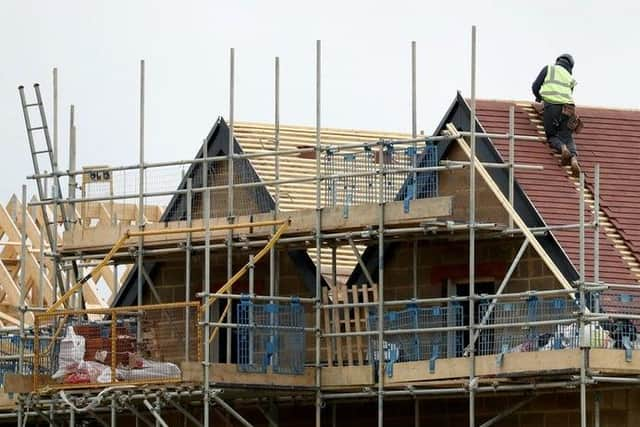Housebuilding is stalled again across the Solent region as nitrates rules get tougher
and live on Freeview channel 276
Since 2018, Natural England and central government have been issuing guidance to local planning authorities (LPA) and developers on how to become nutrient neutral.
Recently, new guidance has been provided which could slow down housing development across the country, with many planning authorities and developers left feeling dismayed.
What is nutrient pollution?


Advertisement
Hide AdAdvertisement
Hide AdNutrients such as nitrogen and phosphorus can wash into marine and freshwater habitats, impacting wildlife and causing environmental harm.
Nitrates and phosphates can be produced in residential and agricultural works such as sewage treatment, septic tanks, wastewater, livestock and arable farming.
Excessive nutrient pollution can speed up the growth of aquatic vegetation and algae faster than the ecosystem can handle.
Large algal blooms and excessive plant growth can deplete oxygen levels in the water, killing fish and preventing birds from feeding.


Advertisement
Hide AdAdvertisement
Hide AdSome algal blooms can elevate toxins and bacterial growth, causing illness in people who drink or eat fish from contaminated water.
If left unchecked, the process (known as eutrophication) can cause significant ecological degradation, in extreme cases, it can create uninhabitable dead zones.
Previous guidance
Many water bodies across the country have been designated as protected sites under the Conservation of Habitats and Species Regulations 2017.
A council cannot grant planning permission if a development poses a threat to a protected site or if the nutrient load is not mitigated.
Advertisement
Hide AdAdvertisement
Hide AdNatural England, a public body tasked with improving and restoring England’s natural environment, advised 32 LPAs in 2018 on nutrient neutrality including Portsmouth City Council and district councils in Fareham, Gosport and Havant.
Nutrient neutrality is the act of mitigating the pollutants by creating wetlands, grasslands or woodlands that strip the nutrients from the water or offsets the pollution elsewhere.
This mitigation scheme, originally known as the Dutch Case, has delayed a number of homes from being built across the country - impeding the government's ambitious housing targets.
New guidance
On March 16, Natural England identified a further 20 protected sites that are in unfavourable condition due to nutrient pollution.
Advertisement
Hide AdAdvertisement
Hide AdAs a result, 42 additional LPAs have been advised with updated guidance on how to mitigate the damage, and many housing developments will need to provide more mitigation compared to the previous guidance.
The government sees neutrality measures as a short term solution, to prevent further environmental harm in the future.
For the long term solutions, the government is consulting the public on the Environment Act targets. These include reducing phosphates from treated wastewater by 80 per cent by 2037.
The government has also committed to restoring 75 per cent of terrestrial and freshwater protected sites to a favourable condition by 2042.
Southern Water
Advertisement
Hide AdAdvertisement
Hide AdThe water firm has stated that it welcomes the new targets and that protecting the environment is ‘a big priority’.
The company attracted criticism in the summer of 2021 for dumping raw sewage into the sea, resulting in a £90m fine.
The firm also carries out wastewater treatment works which pollutes 10 per cent of nutrients into Chichester harbour and four per cent into Langstone harbour.
A spokesman for Southern Water said: ‘Our treatment works are a small contributor to the nutrients such as nitrates and phosphates in sensitive waters around our coast and we work hard to reduce our impact.
Advertisement
Hide AdAdvertisement
Hide Ad‘The wastewater we treat from more than 70 per cent of our customer base in the most sensitive areas already has nutrient removal.
‘We are investing £71.4m to meet new phosphorous limits and have created a £5m environment fund to tackle the effects of the chemicals which cause algal bloom damaging habitats.
‘We work closely with farmers to help them reduce their impact and we are exploring new technologies which will extract more nitrates and phosphates from treated wastewater.’
Portsmouth City Council
The new planning requirements affect councils differently, some will have to incur additional costs and others will have to halt planning applications altogether.
Advertisement
Hide AdAdvertisement
Hide AdPortsmouth City Council is relatively unaffected due to a scheme that refits council house bathrooms to be more water-efficient.
A spokesperson from the council said: ‘PCC has reviewed this advice and will be updating our own strategy and advice to developers and project promoters accordingly.
‘The basis of our strategy, and its ability to continue to support the delivery of sustainable development, is unaffected but for most projects, this means that greater mitigation in order to achieve nutrient neutrality will be needed, and this additional cost will need to be accounted for in new developments.’
Fareham Borough Council
In response to the new guidance four planning applications submitted to Fareham Borough Council were withdrawn and current housing applications will need to be reassessed.
Advertisement
Hide AdAdvertisement
Hide AdExecutive leader of the council, Cllr Seán Woodward, said: ‘It is very disappointing that the updated guidance from Natural England was published without prior notice being given to the Council.
‘There will be a short-term delay in making decisions on planning applications for new houses, whilst they are assessed against the updated guidance. I also recognise that it may result in increased mitigation costs.
‘There are other uses of land, such as agriculture, which lead to higher levels of nitrates entering watercourses and ultimately The Solent.
‘I am sure that many residents will also be shocked, as I was, at the extent of legal and illegal discharges of sewerage that have been made by water companies into the marine environment.
Advertisement
Hide AdAdvertisement
Hide Ad‘I think it is paramount that the government holds the water companies’ “feet to the fire” until they dramatically clean up their act.’
Havant Borough Council
The council states that it always places the environment ‘first and foremost’ when considering housing developments.
The council has temporarily paused the approval of any planning applications to ensure that the environment is protected in line with the new requirements.
Cllr Clare Satchwell, cabinet lead for planning, Hayling seafront strategy and coastal management, said: ‘We recognise the international importance of our coastal landscape and wish to ensure we do everything in our power to meet the legal requirements to protect it.
Advertisement
Hide AdAdvertisement
Hide Ad‘The council is committed to addressing the environmental ramifications resulting from Natural England's revised position and unlocking residential development in the borough again.
‘Bearing in mind the impact that the Dutch Case originally had on the borough meeting its housing supply, I hope a solution is found swiftly to reduce the impact on the council's obligation to government to meet housing need.’
Gosport Borough Council
Planning applications for housing developments are already difficult in Gosport due to the lack of viable sites.
The new guidance on nutrient mitigation has complicated the situation even further, Cllr Graham Burgess, leader of the council said: ‘We’re told to build thousands of houses, we haven’t got room for thousands of houses.
Advertisement
Hide AdAdvertisement
Hide Ad‘Michael Gove ought to come down to Gosport, see how much space we’ve got which is virtually nil and realise that this homes policy and this nutrient scheme is utterly crazy.
‘Southern Water got fined £90m and Cllr Sean Woodward said that money should go to the areas near the coast to try and get things back to normal, we didn’t get a response.
‘They’re the ones who have caused a lot of this, dumping sewage, using any excuse they want - it is totally wrong and we are now having to pick up the cost of this.’
Hampshire & Isle of Wight Wildlife Trust
The HIWWT is a local wildlife conservation organisation with over 27,000 members with the aim of improving conditions for habitats on land or at sea.
Advertisement
Hide AdAdvertisement
Hide AdA spokesperson said that the trust, in general, welcomes the new planning rules but believes there should have been more timely consultation with councils.
‘We believe mitigating and reducing the impact of nitrates is necessary to ensure that new development does not add further to the already high pollution levels in the Solent.
‘Nitrates pollution comes from a range of sources and has built up over decades.
‘Intensive agriculture accounts for around half of nitrates in the Solent, 10% comes from urban sources, including wastewater from existing housing, and a lot also comes from unknown sources.
Advertisement
Hide AdAdvertisement
Hide Ad‘Nitrate mitigation does not address the wider issues of water pollution or planning issues related to housing numbers, local biodiversity or provision of local greenspace.
‘The trust will continue to campaign for these issues to be addressed by government, local authorities, water companies and developers by pushing for stronger policy and regulation.’
The Department for Levelling Up, Housing and Communities
A spokesperson from the DLUHC said: ‘We are committed to preserving precious habitat sites while delivering the homes communities need.
‘Local Planning Authorities will need to carry out nutrient pollution assessments for proposed developments and ensure mitigation is provided so that development can progress.
Advertisement
Hide AdAdvertisement
Hide Ad‘We are providing £100,000 financial support to each affected catchment area, along with practical support to help councils meet Natural England requirements and ensure development can continue.’
Councils affected since 2018
Ashford Borough CouncilBasingstoke and Deane Borough CouncilBournemouth Christchurch and Poole CouncilCanterbury City CouncilChichester District CouncilCornwall CouncilDorset CouncilDover District CouncilEast Hampshire District CouncilEastleigh Borough CouncilExmoor National ParkFareham Borough CouncilFolkestone and Hythe District CouncilGosport Borough CouncilHavant Borough CouncilHerefordshire CouncilIsle of Wight CouncilMaidstone Borough CouncilMendip District CouncilMid Devon District CouncilNew Forest District CouncilNew Forest National Park AuthorityPortsmouth City CouncilSedgemoor District CouncilSomerset West and Taunton District CouncilSouth Downs National Park AuthoritySouth Somerset DistrictSouthampton City CouncilSwale Borough CouncilTest Valley Borough CouncilWiltshire Council
Winchester City Council
Councils newly affected
Allerdale Borough CouncilBorough Council of King’s Lynn and West NorfolkBreckland CouncilBroadland & South Norfolk CouncilCarlisle City CouncilCheshire East CouncilCheshire West and Chester CouncilCopeland Borough CouncilDarlington Borough CouncilDerbyshire Dales District CouncilDurham County CouncilEast Devon District CouncilEast Riding of Yorkshire CouncilEast Staffordshire Borough CouncilEden District CouncilGreat Yarmouth Borough CouncilHambleton District CouncilHartlepool Borough CouncilHigh Peak Borough CouncilHinckley and Bosworth Borough CouncilLake District National ParkLichfield District CouncilMalvern Hills District CouncilMiddlesbrough CouncilNorth Norfolk District CouncilNorth Warwickshire Borough CouncilNorth West Leicestershire District CouncilNorth York Moors National ParkNorthumberland County CouncilNorthumberland National ParkNorwich City CouncilRedcar and Cleveland Borough CouncilRichmondshire District CouncilShropshire CouncilSouth Derbyshire District CouncilSouth Lakeland CouncilStockton-on-Tees Borough CouncilSwindon Borough CouncilThe Broads AuthorityVale of White Horse District CouncilWest Berkshire CouncilPeak District National Park Authority